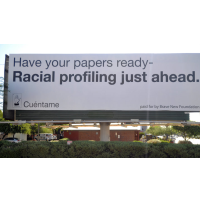When and Why Do Some City Police Departments Enforce Federal Immigration Law?

As the controversy over the Supreme Court decision in the case of Arizona v. United States to strike down three parts of Arizona’s immigration enforcement statute (S.B. 1070) for conflicting with federal immigration law and policy shows, state and local law enforcement sometimes are involved in enforcing federal immigration law. Since there are about 11 million unauthorized immigrants in the U.S., knowing when and why urban police departments get involved with immigration enforcement is an important issue, especially in communities with large numbers of immigrants.
A recently published study, “Why Do (Some) City Police Departments Enforce Federal Immigration Law?” analyzes data from a survey of police chiefs from 237 large- and medium-sized cities nationwide in 2007 and 2008. The study concludes that local law enforcement enjoys a “significant reservoir of bureaucratic discretion” in enforcing such laws, and that the relative power of ethnic groups associated with immigration is a key factor in driving how that discretion is exercised.
Among the police departments surveyed, police checked immigration status in 87% of arrests for violent crimes, 64% of the arrests for domestic violence, 59% of interviews of victims of suspected human trafficking and 21% of traffic violations.
The study found that the presence of a Hispanic police chief correlates with a reduction in the intensity of immigration enforcement, suggesting that the political power associated with a local Latino community being able to win the appointment of a Hispanic chief leads as well to more lenient immigration enforcement, the burdens of which tend to fall upon Latinos regardless of their legal status. In fact, the survey also showed that police in communities with large immigrant populations would enforce immigration regulations in 11% fewer situations.
On the flip side, in cities where the majority of voters are Republican (and thus likely white) and police chiefs report to the mayor and city council rather than to a professional manager, the level of enforcement is more intense. “Police practices…do have a relationship with city government policy. More aggressive immigration policing is associated with a stricter city policy.”
The reason why such white/Republican cities want more immigrant enforcement remains controversial. On the one hand, the study debunks claims that whites demand immigration enforcement because unchecked illegal immigration leads to social pathology, concluding that “objective measures of community crisis, such as rates of unemployment or of violent crime, do not show any significant relationship to” increased enforcement. On the other hand, the fact that only 35% of cities near the Canadian border have a city policy on immigration, while 55% of those near the Mexican border have one, suggests to some that racist attitudes toward Latinos may play a role.
-Matt Bewig
To Learn More:
Why Do (Some) City Police Departments Enforce Federal Immigration Law? (by John Wihbey, Journalist’s Resource)
Why Do (Some) City Police Departments Enforce Federal Immigration Law? Political, Demographic, and Organizational Influences on Local Choices (by Paul G. Lewis, Doris Marie Provine, Monica W. Varsanyi, and Scott H. Decker, Journal of Public Administration Research and Theory) (pdf)
Two U.S. Marshals Killed Pursuing Non-Federal Suspects (by Noel Brinkerhoff and David Wallechinsky, AllGov)
- Top Stories
- Unusual News
- Where is the Money Going?
- Controversies
- U.S. and the World
- Appointments and Resignations
- Latest News
- Trump to Stop Deportations If…
- Trump Denounces World Series
- What If China Invaded the United States?
- Donald Trump Has a Mental Health Problem and It Has a Name
- Trump Goes on Renaming Frenzy






Comments